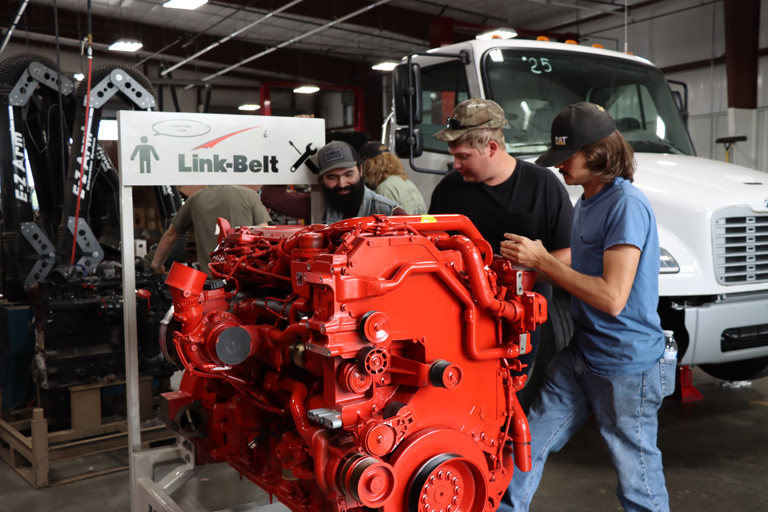Fuel your career with hands-on experience servicing medium and heavy-duty trucks.
What is Diesel Technology?
If you're interested in a career repairing and servicing medium and heavy duty trucks, then this program is for you. Academic courses, theory courses and laboratory experiences are designed to promote success in the diesel technology repair field. You will get hands-on experience repairing late model, medium and heavy duty trucks.

What are my career choices?
Employment of diesel service technicians and mechanics is expected to grow 11 percent from 2006 to 2016. Additional trucks and truck repairers will be needed to keep pace with the increasing volume of freight shipped nationwide. Graduates of the Diesel Technology program find employment in new truck dealerships, fleets, municipalities, independent repair facilities, specialty shops and agricultural repair shops.
Getting Started
What are my degree, diploma, and certificate options?
- General Occupational/Technical Studies AAS
- Agriculture Equipment Technician Diploma
- Construction Equipment Technician Diploma
- Medium and Heavy Truck Technician Diploma
- Agriculture Equipment Mechanic Helper Certificate
- Construction Equipment Mechanic Helper Certificate
- Diesel Engine Mechanic Certificate
- Diesel Mechanics Assistant Certificate
- Diesel Steering & Suspension Mechanic Certificate
- Electrical/Electronics Systems Mechanic Certificate
- Fluid Power Mechanic Certificate
- Heavy Duty Brake Mechanic Certificate
- Heavy Duty Drive Train Mechanic Certificate
- Medium and Heavy Truck Mechanic Helper Certificate
- Mobile Air Conditioning Mechanic Certificate
- Preventative Maintenance Mechanic Certificate
- Undercarriage Mechanic Certificate
How Do I Pay For This?
Worry no more. With the lowest tuition in Kentucky, financial aid options, and a helping hand to guide you through the application process, MCTC has you covered. MCTC will help you reach your goals at a price that won't break the bank.
What Else Do I Need to Know?
Program Student Learning Outcomes
Upon completion of the Construction Equipment Technician diploma, the graduate can:
- Inspect fuel, oil, and coolant levels and condition.
- Interpret engine noises.
- Diagnose engine vibration problems.
- Remove, disassemble, and replace components of winch brake.
- Apply all safety concepts.
- Replace power shift transmission.
- Adjust automatic transmission shift linkage.
- Listen to and verify operator's complaint; review past maintenance documents.
- Inspect and adjust integral-type power steering gear, worm gear preload and sector shaft; inspect and adjust poppet valves.
- Diagnose poor stopping, air leaks, premature wear, pulling, grabbing, or dragging problems caused by supply and service system malfunctions.
- Read, interpret and diagnose electrical/electronic circuits using wiring diagrams.
- Check automatic transmission fluid levels.
- Practice welding safety procedures.
- Determine pin and bushing condition in sealed and lubricated track.
- Use shop equipment and tools.
- Apply the knowledge of the effects of variables on the SMAW process to weld plate and pipe.
Upon completion of the Agriculture Equipment Technician diploma, the graduate can:
- Inspect fuel, oil, and coolant levels and condition.
- Interpret engine noises.
- Diagnose engine vibration problems.
- Remove, disassemble, and replace components of winch brake.
- Apply all safety concepts.
- Replace power shift transmission.
- Adjust automatic transmission shift linkage.
- Listen to and verify operator's complaint; review past maintenance documents.
- Inspect and adjust integral-type power steering gear, worm gear preload and sector shaft; inspect and adjust poppet valves.
- Diagnose poor stopping, air leaks, premature wear, pulling, grabbing, or dragging problems caused by supply and service system malfunctions.
- Read, interpret and diagnose electrical/electronic circuits using wiring diagrams.
- Check automatic transmission fluid levels.
- Practice welding safety procedures.
- Use shop equipment and tools.
- Apply the knowledge of the effects of variables on the SMAW process to weld plate and pipe.
Upon completion of the Medium and Heavy Truck Technician diploma, the graduate can:
- Inspect fuel, oil, and coolant levels and condition.
- Interpret engine noises.
- Diagnose engine vibration problems.
- Apply all safety concepts.
- Listen to and verify operator's complaint; review past maintenance documents.
- Inspect and adjust integral-type power steering gear, worm gear preload and sector shaft; inspect and adjust poppet valves.
- Diagnose poor stopping, air leaks, premature wear, pulling, grabbing, or dragging problems caused by supply and service system malfunctions.
- Read, interpret and diagnose electrical/electronic circuits using wiring diagrams.
- Check automatic transmission fluid levels.
- Use shop equipment and tools.
- Use wiring diagrams during diagnosis of electrical circuit problems.
- Inspect and test fusible links, circuit breakers, and fuses.
Length of Program
This information should not be considered a substitute for the KCTCS Catalog. You should always choose classes in cooperation with your faculty advisor to ensure that you meet all degree requirements.

